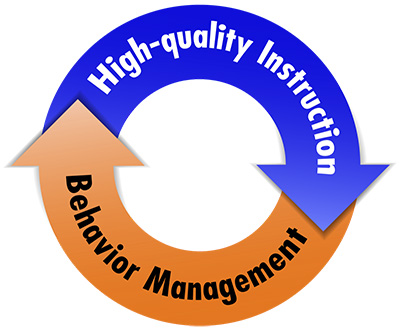Classroom Behavior Management (Part 1): Key Concepts and Foundational Practices
Wrap Up
 To effectively manage disruptive behaviors is a challenge for new and experienced teachers. Teachers often do not receive the training or develop the skills necessary to effectively address disruptive behaviors, focusing instead on the implementation of evidence-based instructional practices. A worthy goal, to be sure, but this frequently leaves teachers feeling unprepared and uncertain when it comes to facing the challenge of unwanted classroom behavior.
To effectively manage disruptive behaviors is a challenge for new and experienced teachers. Teachers often do not receive the training or develop the skills necessary to effectively address disruptive behaviors, focusing instead on the implementation of evidence-based instructional practices. A worthy goal, to be sure, but this frequently leaves teachers feeling unprepared and uncertain when it comes to facing the challenge of unwanted classroom behavior.
Teachers should remember that high-quality instruction and behavior management are interlinked. Without effective classroom management, teachers spend a majority of time dealing with student behavior and less time providing high-quality instruction. Because disruptive behaviors can negatively impact both teachers and students, it’s important for teachers to implement comprehensive classroom behavior management.
Remember, comprehensive classroom behavior management is more than just rules and procedures. Rather, the term refers to a proactive, positive system in which the teacher:
- Creates an organized, consistent, culturally-responsive, and integrated classroom environment that supports effective instruction and promotes student learning
- Engages and communicates with students (and families) in an ongoing manner
To create this system, teachers must understand the key concepts related to behavior as well as the foundational behavior management practices as noted in the table below.
| Key Concepts | Take Away |
|
Cultural influences on behavior |
Understanding how culture influences student and teacher behavior helps teachers identify and address cultural gaps that may exist in their classrooms. |
|
Key principles of classroom behavior management |
Adopting, practicing, and refining the six key principles allows teachers to prevent or decrease instances of disruptive behavior. |
| Behavior Management Practices | Take Away |
|
Create a positive climate |
Creating a climate of empathy, care, collaboration and respect leads to positive academic and behavioral student outcomes. |
|
Create a structured classroom |
Thoughtfully arranging the classroom and creating structured routines promotes student engagement and limits factors that may lead to disruptive behaviors. |
|
Use surface management strategies |
Using surface management strategies allows teachers to quickly, easily, and proactively address disruptive behavior before it escalates without interrupting instruction. |
|
Develop a comprehensive classroom behavior management plan |
Developing a comprehensive classroom behavior management plan explicitly communicates to students how they are expected to behave and the consequences for not doing so, and it helps teachers objectively respond to appropriate and inappropriate student behaviors. |
Listen as Michael Rosenberg discusses the importance of effective classroom behavior management.

Michael Rosenberg, PhD
Professor, Special Education, SUNY New Paltz
Professor Emeritus, Johns Hopkins University
(time: 1:24)
Transcript: Michael Rosenberg, PhD
Effective classroom management is essential for teachers to succeed in addressing the learning needs of their students. We hear over and over and over again from far too many beginning teachers that their greatest challenge is in managing the behaviors of students so they can teach the lessons that they have developed. Unfortunately, far too many have not received adequate training in classroom management because it is assumed that the strength of their instruction alone will manage the behaviors of their students. We know that that’s not true. We know that there are explicit, discrete elements of behavior management that teachers can learn that can facilitate their success in classrooms. The development of a comprehensive management plan allows for all of these elements to come together in one place and allow teachers to implement behavior management in a very clear and direct way and one that leads to increased achievement.
Revisiting Initial Thoughts
Think back to your responses to the Initial Thoughts questions at the beginning of this module. After working through the Perspectives & Resources, do you still agree with those responses? If not, what aspects about them would you change?
What should teachers understand about effective classroom behavior management?
How can teachers increase the chances that their students will behave appropriately?
When you are ready, proceed to the Assessment section.